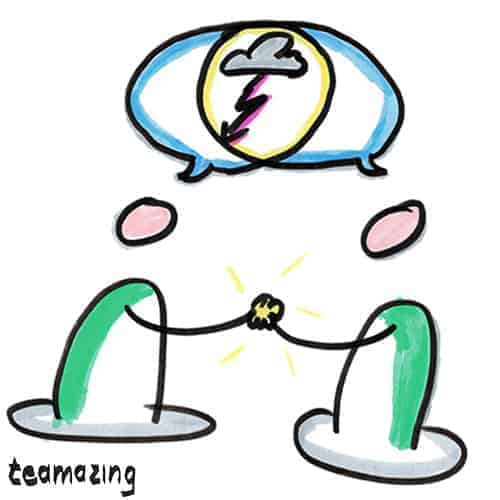Conflict management is the management of clashes between different groups of people or individuals. The goal is to prevent various crisis situations or finding solutions to eliminate such situations.
Conflicts are part of everyday working life and are unavoidable. In order to ensure a good working atmosphere and morale, as well as the performance of the employees, conflict management comes into play. Conflict management attempts to resolve conflicts or to intercept them before they arise (Conflict in the workplace? Here is our practical guide).
Wherever there are people, conflicts are not far away. And this is not always negative. Conflicts can be beneficial to the further development of a company.
Why conflicts are sometimes directional and important
- Problems are finally addressed
- Open discourse ensures that colleagues know the point of view and with whom or what other employees are in conflict
- Conflicts can cause a change in the company’s previous image.
However, in order to actually filter the positive aspects out of conflicts and to use them specifically for the further success of the company, for a great working atmosphere, as well as for the productivity and efficiency of the employees, a structured conflict management is required. The point is to minimize the less good things about conflicts and to make maximum use of the positive opportunities they offer.
In principle, conflict management in a company does not have to be led by a mediator. Managers are usually also well able to do this, as long as they have proper conflict resolutions skills at their hand.
Steps for conflict resolution
In conflict management, there are three major steps in order to get to a solution that is sustainable.
-
Conflict perception
Before a conflict is actually open, it announces itself with various symptoms. Changes in the behaviour of individual staff members, hostile remarks, verbal abusive language, disinterest, avoidance or evasion could be indicative of a conflict.
-
Conflict analysis
The conflict has been identified. This phase of conflict management is about analyzing the problem in depth. Questions like: What is it actually about? What goals are being pursued by the parties involved? What fears and feelings are in the room? How do I see the conflict as an affected party? How do I see the conflict from an outsider’s point of view? How do I see the conflict as an opposing party? What would be the consequences if the conflict is not resolved? – are the questions to be answered here.
-
Conflict handling
The conflict has been diagnosed, now the focus is on finding a solution. In the form of conflict talks, it is possible to analyze and discuss the opposing interests well and thus find ways to solve the problem.
It is important to recognize the stage of the conflict in order to set appropriate courses of action to prevent escalation. The earlier one recognizes the conflict, the more leeway one has.
Conflict resolution strategies
Besides compromise, there are other conflict strategies:
-
Win-loose strategy
If the goal is that one party wants to push through its interests at all costs, the party pursues a win-loose strategy.
-
Loose-win-strategy
The other party, on the other hand, which accepts that its interests are suppressed, pursues a loose-win strategy.
-
Loose-loose-strategy
If both parties vehemently pursue a win-lose strategy, they inevitably end up in a lose-lose situation. This strategy is characterized by no concessions and a compromise is far away.
-
Win-win-strategy
This strategy is the most desirable. It is about finding a solution to the conflict that is not merely acceptable to all parties – as would be the case with a compromise – but from which all parties derive a real benefit. All parties are treated equally in the win-win strategy – no one is right or wrong. The only question is: “How can everyone gain from the situation?”. In most cases, the win-win strategy even crystallizes a completely new approach to a solution.
A lot of conflicts do arise from communication problems. Feel free to check out our Virtual Communication Workshop where we talk giraffe.
Further information on conflict resolution: https://www.pon.harvard.edu/daily/conflict-resolution/types-conflict/




